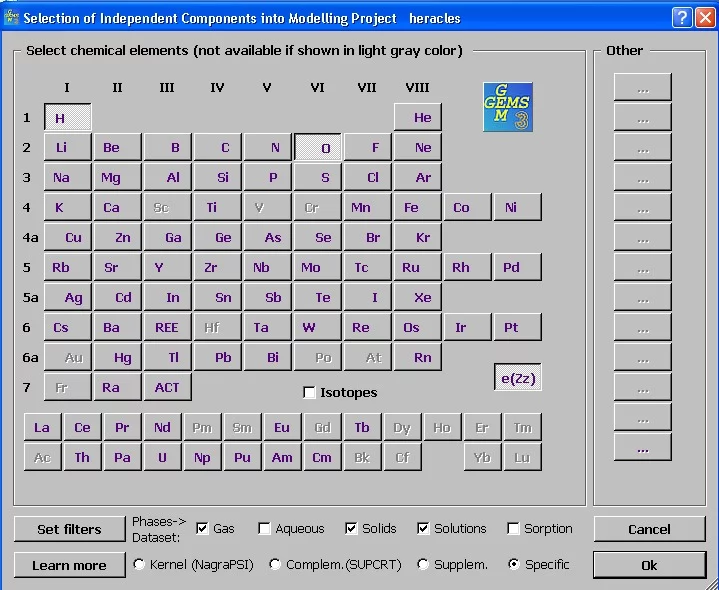The HERACLES-TDB has been compiled to support modeling of U and fission products (FP) solid and gaseous speciation during pyroreprocessing of spent nuclear fuel. The database covers molar thermodynamic properties of compounds of actinides, fission products, and minor actinides covering the elements as shown above. At present, the data for over 610 condensed compounds (including melts and liquid condensates and over 360 gaseous (also charged) species are provided. The gas phase is treated as an ideal mixture of ideal gases; for melts the non-ideality of mixing is taken into account using models like Redlich-Kister, NRTL, UNIQAC, Bregg-Williams, Compond Energy Formalism, etc. In total GEMS has around 30 Mixing Models implemented.
For each compound or gas, the stoichiometry formula is provided together with the molar enthalpy (of formation from elements at their standard states), absolute entropy and heat capacity at standard state (Tr = 298.15 K and Pr = 1 bar). In most cases, the molar Gibbs energy of formation at Tr was calculated from ΔH0(Tr) and S0(Tr) and entropies of elements at standard state. Necessary auxiliary thermodynamic data were taken from (Cox at al., 1989).
Values of standard molar Gibbs energy function ΔG0(Tr) of a compound, needed for calculation of equilibria at elevated temepratures, can be calculated from the following equation [Karpov et al., 1989]:
$g_T^0 &=& G_{T_r}^0 - S_{T_r}^0 * (T-T_r)-T \sum_{i} Mn_i a_i$
where G0(Tr) and S0(Tr) are the standard molar Gibbs energy and absolute entropy at Tr.
The terms Mni are given by equation:
$Mn_i &=& \dfrac{T^{n_i}}{n_i (n_i + 1)} + \dfrac{T_r^{n_i + 1}}{T (n_i + 1)} - \dfrac{T_r^{n_i}}{n_i}$
where ni are power coefficients: n0 = 0; n1 = 1; n2 = -2; n3 = -0.5; n4 = 2; n5 = 3; n6 = 4; n7 = -3; n8 = -1; n9 = 0.5.
Empirical coefficients a0 - ai refer to the polinomial heat capacity function on temperature. In most of the cases i=5 corresponding to the Haas-Fischer equation (see eq. below). The data on Cp0= f (T) are provided for each compound in the database in the temperature range of 298 K – 3000 K. For gaseous species, methods of statistical thermodynamics were applied, hence the temperature interval considered is much broader and in some cases reaches 6000 K.
$Cp(T) &=& a_0 + \sum_{i} a_i T^{n_i}$
References used for the compilation of the database
- http://webbook.nist.gov/chemistry
NIST-JANAF Themochemical Tables
JOURNAL OF PHYSICAL AND CHEMICAL REFERENCE DATA Fourth Edition, Monograph 9 , ( 1998 ).Chemical thermodynamics of selenium
CHEMICAL THERMODYNAMICS series 7, (2005).Update on the chemical thermodynamics of Uranium, Neptunium, Plutonium, Americium and Technecium
CHEMICAL THERMODYNAMICS series 5, (2003).Thermochemical Data for Reactor Materials and Fission Products
Elsevier (1990).Decomposition pressures and thermodynamic properties of RuTe2
The JOURNAL OF CHEMICAL THERMODYNAMICS 9, 789 (1977).The constitution of the ruthenium – tellurium system
JOURNAL OF NUCLEAR MATERIALS 209, 128 (1994).Thermodynamic properties of individual substances
"Nauka" publishing Fourth Edition (in Russian), (1978).Chemical thermodynamics of Americium
CHEMICAL THERMODYNAMICS series 2, (2004).Chemical thermodynamics of Technecium
CHEMICAL THERMODYNAMICS series 3, (1999).Chemistry of the Elements
Oxford: Butterworth-Heinemann publishing Second edition, (1997).Chemical Thermodynamics of Neptunium and Plutonium
CHEMICAL THERMODYNAMICS series 4, (2001).Actinide carbides. A review of thermodynamic properties
IAEA PROCEEDINGS 397 (1967).Thermodynamics of plutonium carbides
IAEA PROCEEDINGS 467 (1967).Gaseous Actinide Ions in The Chemical Thermodynamics of Actinide Elements and Compounds
IAEA 13, 100 (1985).Chemical thermodynamics of Thorium
CHEMICAL THERMODYNAMICS series 11, 195 (2007).Thorium: preparation and properties
The Iowa State University Press 250 (1975).CODATA Key Values for Thermodynamics
Hemisphere Publishing Corporation ( 1989).CODATA Thermodynamic Tables
National Bureau of Standards (1987).Simultaneous evaluation and correlation of thermodynamic data
AMERICAN JOURNAL of SCIENCE 225, 276 (1976).Chemical Enciclopedie
"Sovetskaya Enciclopedia" publishing (in Russian), 128 (1998).Thermochemical properties of pure substances
VCH (1995).Die Flüchtigkeitsergenschaften des Poloniums
PSI REPORT 02-12, (2002).
